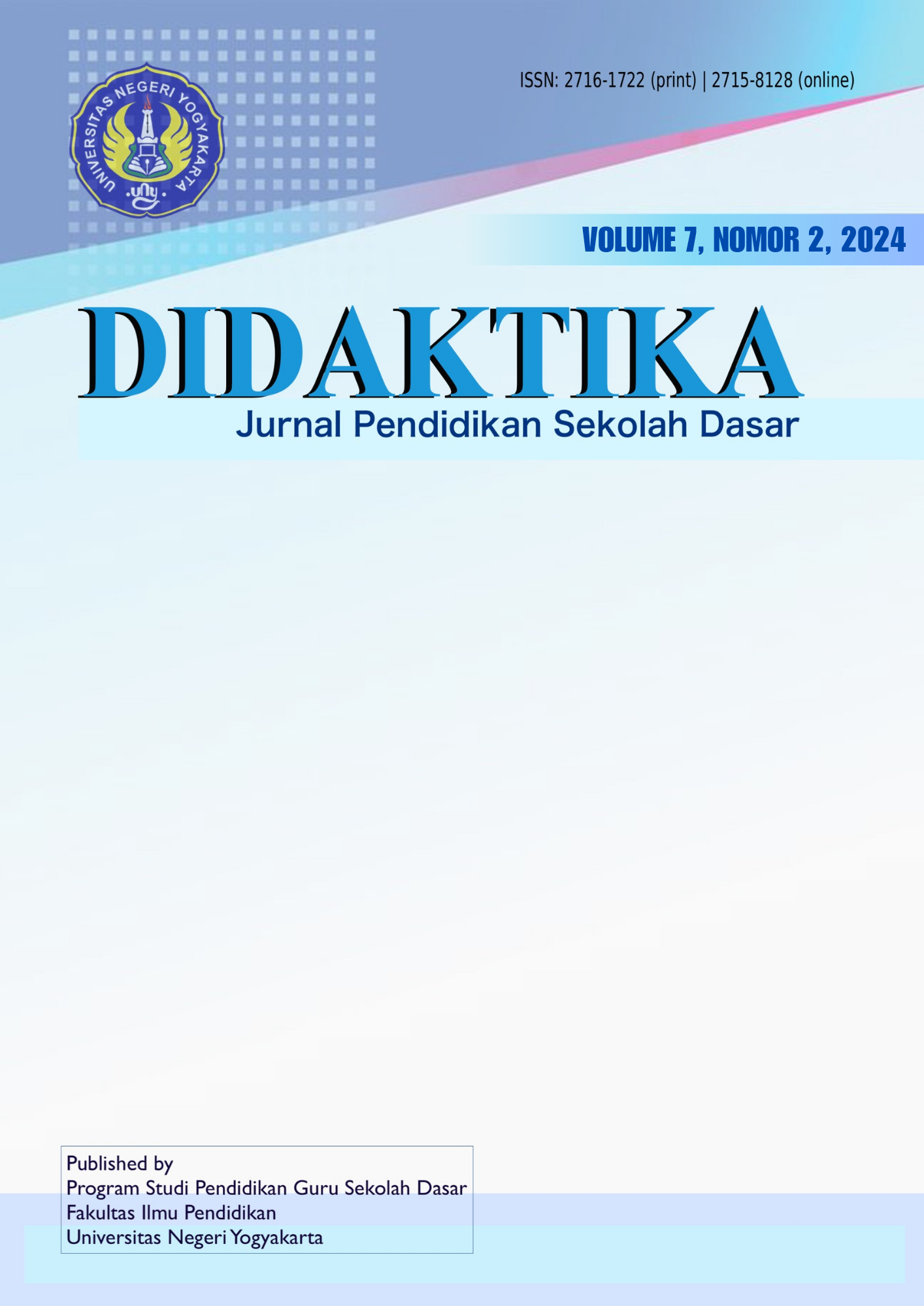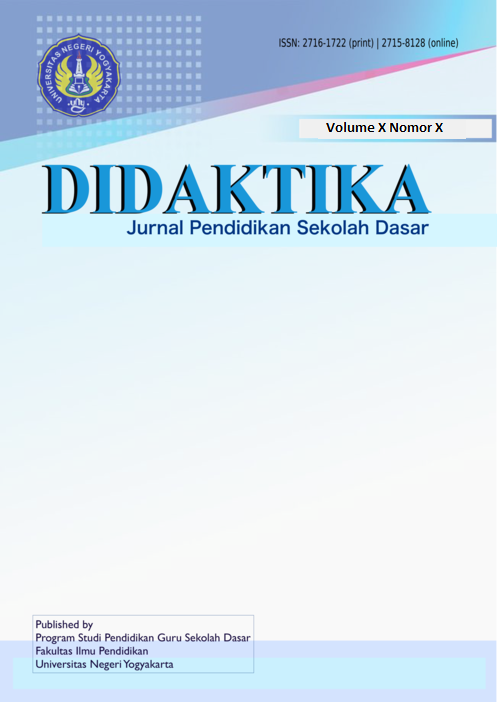Exploring the Profile of Numerical Resilience in Elementary Pre-Service Teachers: A Portrait of Readiness to Face Challenges of the 21st Century
DOI:
https://doi.org/10.21831/didaktika.v7i2.80538Abstract
In this era of disruption, recilience of numeracy plays a role as one of the skills used to compete in the global world. The urgency of resilience is as a mental guideline to fight in various challenges. Numerical resilience also plays a role as a way for teachers to adapt to various very rapid rates of change. This study aims to analyze the numeracy resilience profile of prospective elementary school teacher education teachers in Yogyakarta. The method used is quantitative descriptive with data collection through tests, observations, and interviews with 159 students. Data analysis uses statistical descriptive to describe the condition of numeracy resilience, including perseverance, self-confidence, ability to socialize, self-motivation, use of ICT, and creativity in producing innovative solutions. The results of the study indicate that the level of numeracy resilience of prospective teachers is still limited, with an average score indicating mental resilience that needs to be improved. Students tend to be less active in socializing and dialogue and building motivation from failure. The use of ICT and various learning resources is also still limited. In addition, the ideas and innovative solutions produced by prospective teachers are still lacking, indicating the need to strengthen creativity and problem-solving skills. These findings indicate the need for more intensive educational interventions to prepare prospective teachers to face the challenges of 21st century education. Efforts needed include in-depth training on the use of ICT, improving social skills, and strengthening critical and creative thinking skills in designing numeracy learning in elementary schools.
References
Aini, P. N. (2022). Hubungan Dukungan Orang Tua Dengan Resiliensi Akademik Pada Remaja SMP Negeri Di Kecamatan Ngrambe. QUANTA J. Kaji. Bimbing. Dan Konseling Dalam Pendidik., 6(2), 38–45. https://doi.org/10.22460/q.v6i2p11-19.3040
Annisa, R. N., & Dewi, D. A. (2021). Pendidikan Kewarganegaraan di Era Revolusi 4.0. ... : Indonesian Journal of Islamic Studies. http://journal.civiliza.org/index.php/ijois/article/view/26
Ayebale, L., Habaasa, G., & Tweheyo, S. (2020). Factors affecting students' achievement in mathematics in secondary schools in developing countries: A rapid systematic. Statistical Journal of the IAOS, 36(S1), S73–S76. https://doi.org/10.3233/sji-200713
Dinata, E. (2023). Hubungan Antara Self-Regulated Learning Dengan Resiliensi Akademik Pada Mahasiswa. Jiip - Jurnal Ilmiah Ilmu Pendidikan, 6(12), 10771–10778. https://doi.org/10.54371/jiip.v6i12.2502
Fitri, S., Syahputra, E., & Syahputra, H. (2019). Blended learning rotation model of cognitive conflict strategy to improve mathematical resilience in high school students. International Journal of Scientific and Technology Research, 8(12), 80–87.
Gu, Q. (2014). The role of relational resilience in teachers career-long commitment and effectiveness. Teachers and Teaching: Theory and Practice, 20(5), 502–529.
https://doi.org/10.1080/13540602.2014.937961
Hafiz, M., Darhim, & Dahlan, J. A. (2017). Comparison of Mathematical Resilience among Students with Problem Based Learning and Guided Discovery Learning Model. Journal of Physics: Conference Series, 895(1). https://doi.org/10.1088/1742-6596/895/1/012098
Harahap, A. C. P., Harahap, S. R., & Harahap, D. P. S. (2020). Gambaran Resiliensi Akademik Mahasiswa Pada Masa Pandemi Covid-19. Al-Irsyad, 10(2). https://doi.org/10.30829/al-irsyad.v10i2.8541
Hendriani, W. (2017). Adaptasi Positif Pada Resiliensi Akademik Mahasiswa Doktoral. Humanitas Indonesian Psychological Journal, 14(2), 139. https://doi.org/10.26555/humanitas.v14i1.5696
Hutauruk, A. J. B., & Priatna, N. (2017). Mathematical Resilience of Mathematics Education Students. Journal of Physics: Conference Series, 895(1). https://doi.org/10.1088/1742-6596/895/1/012067
Indonesia, I., Nation, U., Goals, S. D., Indonesia, S., & Nam, V. (2016). © oecd 2016. 1–8.
Ishak, N. H. F. B., Yusoff, N. F. B. M., & Madihie, A. (2020). Resilience in mathematics, academic resilience, or mathematical resilience?: An overview. Universal Journal of Educational Research, 8(5 A), 34–39. https://doi.org/10.13189/ujer.2020.081905
Johnston-Wilder, S., & Lee, C. (2014). Developing Mathematical Resilience. Choice Reviews Online, 51(06), 51-2973-51–2973.
Komala, E. (2018). Mathematical Resilience Mahasiswa Pada Mata Kuliah Struktur Aljabar I Menggunakan Pendekatan Explisit Instruction Integrasi Peer Instruction. Mosharafa: Jurnal Pendidikan Matematika, 6(3), 357–364.
https://doi.org/10.31980/mosharafa.v6i3.324
Kooken, J., Welsh, M. E., Mccoach, D. B., & Johnson-Wilder, Sue and Lee, C. (2013). the Construct of Resilience To the Study of Mathematics . American Educational Research Association (AERA) 2013 Annual Meeting: Education and Poverty: Theory, Research, Policy and Praxis.
Kooken, J., Welsh, M. E., McCoach, D. B., Johnston-Wilder, S., & Lee, C. (2016). Development and Validation of the Mathematical Resilience Scale. Measurement and Evaluation in Counseling and Development, 49(3), 217–242. https://doi.org/10.1177/0748175615596782
Kubátová, J., & KroÄil, O. (2022). A conscious leadership competency framework for leadership training. Industrial and Commercial Training, 54(2), 279–292. https://doi.org/10.1108/ICT-08-2021-0062
Leonard, J., Walker, E. N., Bloom, V. R., & Joseph, N. M. (2020).
Mathematics Literacy, Identity Resilience, and Opportunity Sixty Years since "Brown v. Board": Counternarratives of a Five-Generation Family. In Journal of Urban Mathematics Education (Vol. 13, pp. 12–37).
Macnab, D. S., & Payne, F. (2003). Beliefs, attitudes and practices in mathematics teaching: Perceptions of Scottish primary school student teachers. Journal of Education for Teaching, 29(1), 55–68. https://doi.org/10.1080/0260747022000057927
Makur, A. P., & Prahmana, R. C. I. (2015). Penyebab Kecemasan Matematika Mahasiswa Calon Guru Asal Papua. Jurnal Elemen, 1(1), 1. https://doi.org/10.29408/jel.v1i1.84
Muharom, F., & Fikriyati, M. (2022). Creating Student Well Being in A Time of Pandemic in Children's Schools. Nazhruna: Jurnal Pendidikan Islam, 5(2), 367–378. https://doi.org/10.31538/nzh.v5i2.2116
Muntazhimah, M., & Ulfah, S. (2020). Mathematics resilience of pre-service mathematics teacher. International Journal of Scientific and Technology Research, 9(1), 1442–1445.
Nahdi, D. S., Jatisunda, M. G., & Suciawati, V. (2021). Pre-service teacher's ability in solving mathematics problems viewed from Self-Resilience. Malikussaleh Journal of Mathematics Learning (MJML), 4(2), 117. https://doi.org/10.29103/mjml.v4i2.2916
Niss, M. (2013). Modeling Students' Mathematical Modeling Competencies. Jurnal Matematika Kreatif-Inovatif, 6(1), 45–59.
Nuraini, A. (2023). Resiliensi Matematis Siswa SMP Pada Pembelajaran Matematika Secara Daring. Supermat (Jurnal Pendidikan Matematika), 7(1), 92–105. https://doi.org/10.33627/sm.v7i1.1081
Peatfield, N. (2015). Affective aspects of mathematical resilience. Proceedings of the British Society for Research into Learning Mathematics, Vol. 35(June), 70–75.
Poekert, P., Alexandrou, A., & Shannon, D. (2016). How teachers become leaders: an internationally validated theoretical model of teacher leadership development. Research in Post-Compulsory Education, 21(4), 307–329.
https://doi.org/10.1080/13596748.2016.1226559
Rahmatiya, R., & Miatun, A. (2020). Analisis Kemampuan Pemecahan Masalah Matematis Ditinjau Dari Resiliensi Matematis Siswa SMP. Teorema Teori Dan Riset Matematika, 5(2), 187. https://doi.org/10.25157/teorema.v5i2.3619
Rakhmawati, Y., & Mustadi, A. (2022). The circumstances of literacy numeracy skill: Between notion and fact from elementary school students. Jurnal Prima Edukasia, 10(1), 9–18. https://doi.org/10.21831/jpe.v10i1.36427
Septianmar, P., P, S. E., & Afiati, N. S. (2022). Hubungan Antara Dukungan Sosial Keluarga Dan Motivasi Belajar Dengan Resiliensi Akademik Pada Siswa Sma Di Masa Pandemi Covid-19. Psikosains (Jurnal Penelitian Dan Pemikiran Psikologi), 17(2), 159. https://doi.org/10.30587/psikosains.v17i2.4595
Wati, R. L. (2023). Profil Resiliensi Akademik Siswa SMP Pasca Pandemi Covid-19. Pedagogika Jurnal Pedagogika Dan Dinamika Pendidikan, 11(1), 120–125.
https://doi.org/10.30598/pedagogikavol11issue1page120-125
Wibowo, A., Slamet, I., & Sudjadi, I. (2018). Construct Validity of Mathematical Resilience: Confirmatory Factor Analysis. 160(Incomed 2017), 261–264. https://doi.org/10.2991/incomed-17.2018.55
Yaman, S. W. (2023). Hubungan Antara Resiliensi Akademik Dan Motivasi Belajar Selama Pembelajaran Daring Pada Siswa SMPN 1 Pinrang. Peshum, 2(4), 700–711. https://doi.org/10.56799/peshum.v2i4.1813
Yan, J., Hou, Y., Shen, Y., & Kim, S. Y. (2022). Family Obligation, Parenting, and Adolescent Outcomes Among Mexican American Families. In Journal of Early Adolescence (Vol. 42, Issue 1). https://doi.org/10.1177/02724316211016064
Yuliyanti, Y., Winarso, W., & Misri, M. A. (2019). Analisis Profil Guru Matematika dalam Membangun Konsep Diri Siswa. Jurnal Mathematic Paedagogic, 3(2), 107. https://doi.org/10.36294/jmp.v3i2.417
Zan, R., & Di Martino, P. (2008). Attitude Toward Mathematics: Overcoming the Positive/Negative Dichotomy. The Montana Mathematics Enthusiast, Monograph, 157–168.
Zanthy, L. S. (2018). Kontribusi Resiliensi Matematis Terhadap Kemampuan Akademik Mahasiswa Pada Mata Kuliah Statistika Matematika. Mosharafa Jurnal Pendidikan Matematika, 7(1), 85–94. https://doi.org/10.31980/mosharafa.v7i1.344
Downloads
Published
How to Cite
Issue
Section
Citation Check
License
- Authors retain copyright and grant the journal right of first publication with the work simultaneously licensed under a Creative Commons Attribution License that allows others to share the work with an acknowledgement of the work's authorship and initial publication in this journal.
- Authors are able to enter into separate, additional contractual arrangements for the non-exclusive distribution of the journal's published version of the work (e.g., post it to an institutional repository or publish it in a book), with an acknowledgement of its initial publication in this journal.
- Authors are permitted and encouraged to post their work online (e.g., in institutional repositories or on their website) prior to and during the submission process, as it can lead to productive exchanges, as well as earlier and greater citation of published work.







